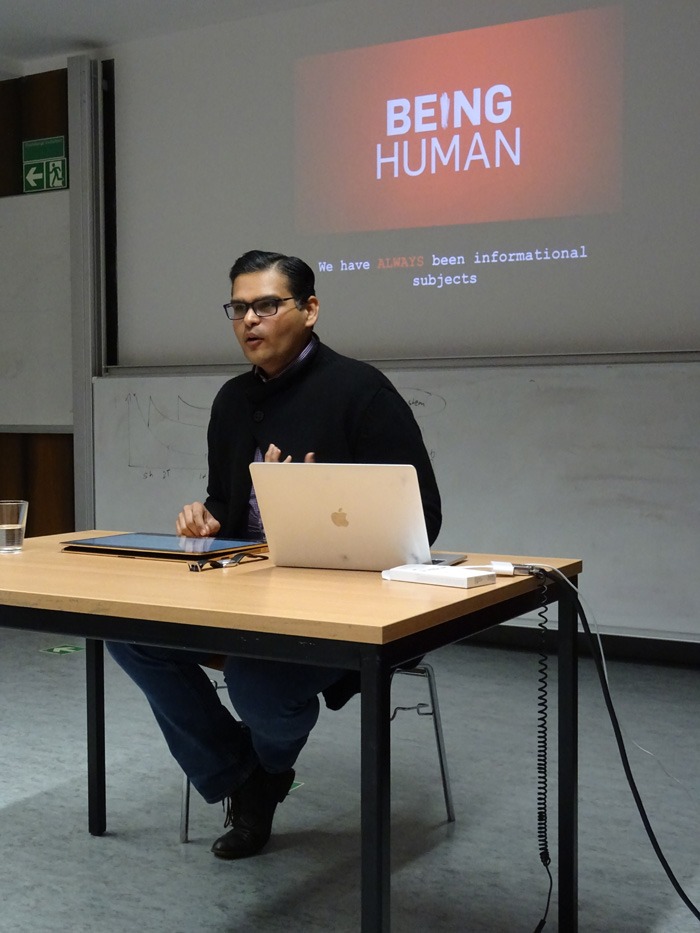THE POLITICS OF DISCONNECTEDNESS: NET NEUTRALITY AND UNIVERSAL ACCESS TALK BY NISHANT SHAH
We have entered a new era of the divisible data subject, requiring us to rethink outdated concepts of the self, argued Nishant Shah, dean of Research at the ArtEZ Univesity, the Netherlands, at the LMU Oberseminar lecture hosted by For Digital Dignity Project ONLINERPOL. Shah said a rethinking of the concept of self is needed to grasp and critique the efforts of commercial interests to exploit new possibilities accompanying the shift towards the divisible data subject.
Shah elaborated on the campaign around net neutrality and zero rating in India to examine the changing nature of connectivity within a digital network and the new intersections that need to be developed to safeguard the human subject in networked societies.
Beginning with the notion of information overload, Shah argued that this concept belongs to the past – the era of the “narrative subject”. This outdated view of the self as a coherent and unique entity has been replaced by one that is inherently fractured, an assemblage of distinct and interchangeable parts – the “data subject”. While the narrative subject had to be shielded from an information excess, the data subject naturalized and incorporated this state of being, eliminating its character of crisis and pathology. Shah pointed out two major changes that enabled its rise. First was the shift from representation to simulation, where we no longer think about our subject as morally bound to stand in for something that is out there. The conception of subjects as unique and bounded individuals was replaced by a conception of selves as identical with a few variables. Second was the shift from the analogue to the digital data subject marked by counting, transforming, memory and storage.
Shah concluded by discussing his successful efforts to halt the project of Internet.org in India, an initiative spearheaded by Facebook with the promise of universal internet access as a fundamental right and pathway to equity for people across the digital divide. However, this promise came with a catch: internet usage being free, it was intended to be limited to certain cherrypicked websites only.

“Free Basics” charging for access to additional content and having the power to enable them faster data traffic was violating the value of Net Neutrality. In spite of its successful prevention in India, Dr. Shah raised concerns about the privileged and digitally connected publics speaking on behalf of the disconnected and a lack of alternatives proposed to ensure universal internet access, leaving it detached from fundamental human rights.
During the Q&A, comments were made concerning humor as a powerful weapon against corporate interests, advertising strategies of multinational agencies, the reappropriation of the concepts and possible translations of Big Data into an aesthetic form.
Prof Dr Nishant Shah is the Dean of Research at ArtEZ University of the Press in the Netherlands, where he is building a new graduate school that seeks to define and shape the role of art and design in unpredictable futures. He is a professor for culture and Aesthetics of Digital Media at Leuphana University, where he teaches and advises research at the intersections of digital technologies, gender and sexuality, and digital humanities. He was the co-founder of the Centre for Internet & Society, in Bangalore India, which continues to engage in questions of Internet Governance, Digital Activism, and Material Infrastructures of the Internet. He has been the knowledge partner with development aid agencies like Hivos, an advisor on global knowledge networks like digital media and learning at UCHRI and the Network of Centres for Internet & Society, and has authored and continues to write academic and public work that he characterises as radical humanities and persistent digital feminism.
Nishant’s current interests are around the material histories of computational digital networks, and thinking through conditions of being human in the face of ubiquitous artificial intelligence.